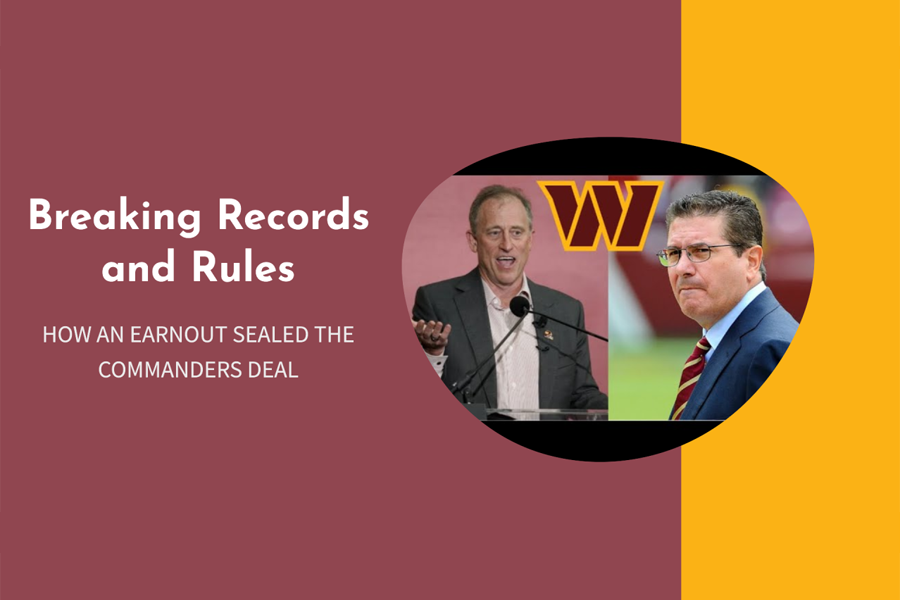Garren Work, MBA
VP, Mergers & Acquisitions Advisor for Businesses <$100MM
Click here to view original article
Nearly a year ago, all 32 NFL Owners met in a special session to vote on the approval [i] of the sale of Dan Snyder’s Washington Commanders for a whopping $6.05 Billion to a group led by Josh Harris. After numerous controversies involving Snyder caused several delays in the deal, many assumed the vote was just a formality, as the NFL was eager to move on. The price tag shattered the previous record for a sports franchise set by the Denver Broncos sale [ii] a year earlier for $4.65 Billion, a vote that took less than an hour. However, the Commanders’ vote took an exhausting 2 hours and 45 minutes. So, what was all the discussion about?
First, a widely reported fine was levied against Snyder. Amid several controversies, the NFL determined a $60 Million fine was appropriate following sexual harassment investigations on the disgraced owner.
Second, with far less media coverage, was that Josh Harris’s record-setting bid included an Earnout provision [iii]. Despite years of controversy and several weeks of delay, the NFL Owners spent hours during their special session asking themselves: What is an Earnout? [iv]
NBC Sports revealed the deal included an “earnout clause” that would give Snyder deferred payments based on the franchise “reaching specified financial benchmarks.” This Earnout left some of the Owners confused, with the Washington Post reported “earnouts can be common in regular business deals. But you usually don’t see them in regards to the sale of sports teams. It is a complex deal.” Several Owners expressed concern the Earnout put the deal “well above” the $1.1 Billion debt limit for all NFL teams.
Taking a closer look
Josh Harris’s and his group of investors needed to find a way to bridge a valuation gap. In a leaked investment presentation [v], Harris initially valued the team at $5.1 Billion, leaving a $950 Million gap from the eventual purchase price. Harris’ needed to find a way to unlock value with his offer to satisfy the Seller. At the same time Harris was struggling to raise more cash from investors, expressing concern at specific risks caused by Snyder’s controversies. Harris couldn’t seek additional lending since he was already borrowing at the NFL’s $1.1 Billion debt limit.
Harris, who founded private equity firm Apollo, put his 20 years of dealmaking experience to the test and presented his deal with an Earnout. The Earnout likely settled between a rumored [vi] $200 Million and the $950 Million gap from the investment package. While the exact terms of the Earnout weren’t made public, it was critical to getting the deal done. The Earnout stipulated that the team needed to hit certain financial benchmarks to cause additional future payments to the Seller. Harris’ investor presentation confirms this, citing Snyder’s continued involvement as the cause of the team’s subpar financial performance and expected additional long-term profitability post-close. Harris wasn’t willing or able to pay more cash upfront, but the Earnout allowed Snyder to be paid if financial performance improved as expected.
As the NFL Owners correctly concluded, Earnouts are not considered debt. The contingent nature of an Earnout requires specific performance for the Earnout amount to be due and is only paid if the targets are met. With a year now passed, perhaps we may soon see follow-up news on whether financial milestones set out in the deal are met and the Earnout paid.
Summary
Josh Harris’s struggle mirrors that of many private deals, as you would expect in the Lower-Middle Market, despite its 10-digit price tag. He struggled to raise enough capital, faced debt restrictions, and needed to get creative to bridge the valuation gap to get the deal done. The Earnout cited specific extraordinary risks tied to the former owner and was structured to allow payout to the Seller if those assumptions were correct and the financials targets were met. The NFL eventually approved the use of the earnout, appeasing all parties and allowing the deal to close.

